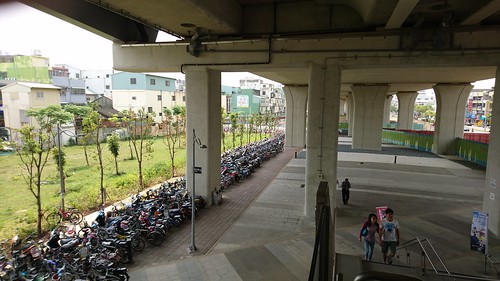I would be writing on the KMT chairmanship election, due up in a couple of weeks, but... it's boring at the moment.
Fortunately, Kate Hart and Tim Rich have produced a piece on Tsai's first year. President Tsai’s Scorecard, One Year On. Hart and Rich analyzed the findings of an NCCU poll, concluding....
Although the usual suspects in influencing perceptions of presidents in Taiwan remain influential, our findings suggest greater attention should be placed on the importance of livelihood issues. For example, perceptions of cross-Strait relations remain salient in regards to presidential evaluations, yet individual positions on this are tied largely to longstanding divisions in partisan identification. Meanwhile, positions on the livelihood issues are likely less fixated on traditional fault partisan lines. That livelihood issues produced such a strong finding may also be due to the term encompassing a broad range of smaller but often overlooked issues. Regardless, the findings suggest means to improve Tsai’s approval ratings that do not require the cooperation of Beijing. In sum, the evidence of the importance of livelihood issues further illustrates that “all politics is local.”This observation is the meat:
However, evaluation of Tsai on livelihood issues generated the largest influence in models using the leadership or morality scores as the outcome. It is also worth noting that the survey also asked which policy area should be Tsai’s priority, with nearly half (45.54%) stating economic development and 16.46% stating cross-Strait relations.Hart and Rich's observation that Tsai's approval ratings can be improved in ways that do not require the cooperation of Beijing is spot on. This is supported by much data. For example, this poll from UDN, the rabidly pro-KMT paper, on Tsai's inaugural address notes that....
Asked if they were concerned about Beijing’s possible cessation of cross-strait communication and contact mechanism, and the cutting of negotiation channels between the two sides because Tsai did not mention the “1992 consensus” in her inaugural speech, 60 percent said they do not fear the consequences, 27 percent said they worry that cross-strait links would change and 13 percent had no comment.The Cross Strait Policy association polled the public in March, finding that nearly 77.2% regard Beijing as hostile to Taiwan. 70% also supported her goal of maintaining the status quo. There is a consensus in Taiwan on cross-strait issues: don't move off the status quo of de facto independence. That is why a mere 16.5% of people in Hart and Rich's data think Tsai should prioritize cross-strait relations -- for the population as a whole, that issue is settled.
Twent-six percent of the respondents said they believe there would be no big changes on the development of cross-strait relations during Tsai’s tenure, 18 percent said ties would improve, 21 percent said they would deteriorate and 25 percent had no comment, the survey showed.
It is important to note that when former President Ma attempted to put Taiwan into China's orbit, the public slapped down the KMT. KMT officials who ardently advocate annexing Taiwan to China, such as current KMT Chair Hung Hsiu-chu, are not welcomed by the electorate.
That said, the economic issues remain pressing. Taiwan's manufacturing activity continued its recent strong run in April, and the economy grew at 2.5% in the first quarter. Net national household wealth actually rose thanks to the property bubble, but the younger generation is seeing none of it. Salaries remain at late 1990s levels, driving many young people start their own businesses, increasing entrepreneurial activity.
All these people vote.
_______________________
[Taiwan] Don't miss the comments below! And check out my blog and its sidebars for events, links to previous posts and picture posts, and scores of links to other Taiwan blogs and forums!

No comments:
Post a Comment